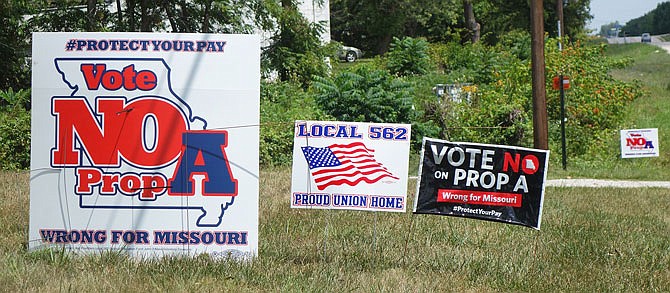Voters across Missouri resoundingly rejected right to work during Tuesday's vote.
Unofficial results from the state of Missouri showed 67.46 percent voted "No" on Proposition A and struck down the Missouri law, which prohibited any contract or employer from requiring someone to be a union member or to pay dues or fees to a union in order to hold a job. It also required unions to represent non-union employees at a unionized workplace.
In Callaway County, 62.62 percent of voters (6,410) voted "no" on Proposition A, while 37.38 percent (3,827) voted "yes." On 91 ballots, voters chose neither "yes" nor "no," according to the Callaway County Clerk's office.
In all, 37 percent of registered voters (10,333) in Callaway County participated in the midterm vote, the clerk's office said. That's higher than the number who participated in the 2016 midterms, when only 28.86 percent cast ballots.
"The result is wonderful," said Bryant Liddle, a Fulton resident who still pays his Communications Workers of America dues nine years after retiring. "Now, the people that voted 'no' on this issue have to realize the importance of their choice in November."
He said he fears re-electing the same crop of politicians who supported right to work will lead to another attempt to put the law in place.
Though former Gov. Eric Greitens signed it into law in 2017, unions rallied and gathered more than 300,000 signatures demanding it be put to a public vote.
The referendum was the first chance for the public to weigh in on union powers since the U.S. Supreme Court ruled in late June that public sector employees cannot be compelled to pay fees to unions. Missouri's ballot measure essentially would have extended that to all private sector employees, mirroring laws that already exist in 27 other states.
The union victory came at a steep cost, however.
Unions powered an opposition effort that had spent more than $15 million as of late July, more than three times as much as various groups that support right to work. Advertisements generally have focused on economics, with supporters claiming right to work would lead to more jobs and opponents claiming it would drive down wages. Both sides claim economic studies backed their position.
This might not be the end of the right-to-work battle, however.
Missouri Chamber of Commerce and Industry President Dan Mehan vowed to the Associated Press that right-to-work supporters would try again, saying: "With the future of our state's economy on the line, we cannot concede hope that Missouri will soon join most other states and pass freedom to work protections."
The Associated Press contributed information to this story.

